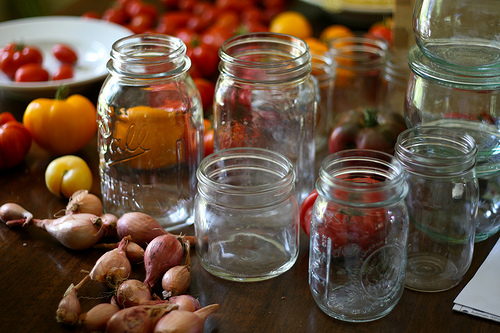Send your question to Umbra!
Q. Dear Umbra,
My wife and I belong to a CSA. We are getting some cucumbers that I would like to try and pickle. My wife says the lids to the classic mason jars have BPA in them. Do you know how much of a concern this is in the context of canning? Is this a recent development? Are there alternatives to mason jars?
Teak Lynner
A. Dear Teak,
 Put a (BPA-free) lid on it!Photo courtesy chiots run via FlickrYour wife is a keeper. She’s right about the classic mason jar’s connection to BPA. The glass jars themselves do not have BPA. It’s the lids — or more accurately, the lid linings. What a pickle! You want to can, not get can-cer!
Put a (BPA-free) lid on it!Photo courtesy chiots run via FlickrYour wife is a keeper. She’s right about the classic mason jar’s connection to BPA. The glass jars themselves do not have BPA. It’s the lids — or more accurately, the lid linings. What a pickle! You want to can, not get can-cer!
BPA, the abbreviation for bisphenol A, is a synthetic estrogen used to make some plastics hard and as a resin in can linings so they don’t rust. BPA also shows up in odd places like non-metal dental fillings, the thermal paper used for cash register receipts, medical devices, baby bottles, some plastic water bottles, and food containers. It’s been in use for several decades. But it is definitely something you want to avoid. Even trace exposure can disrupt your endocrine system and create all kinds of health problems, including cancer, adult-onset diabetes, and obesity.
As I always say, “BPA, stay away!”
But here’s the problem: it isn’t easy to avoid BPA. The Centers for Disease Control found that 93 percent of Americans tested have BPA in their bodies. Canned food may be the primary source of exposure. So if you’re going the extra mile to can your own food, Teak, it would be nice to go the extra, extra mile to be free from BPA.
I spoke to Dr. Anila Jacob, Senior Scientist and the resident physician at the Environmental Working Group, about ways to avoid BPA when you’re canning.
“We know BPA leaches when it comes in contact with the food,” she said. “One thing you can do is try not to fill the jar all the way up to the top, but that’s hard because when you move it, it’s going to shake.”
The safest solution is BPA-free lids. And they’re out there. Jacobs recommends calling lid manufacturers to check; most have a 1-800 number for concerned consumers like yourself. You might also take Jacobs’ advice and drop the Food and Drug Administration a line requesting that they ban BPA. “The more the FDA hears about it, the more likely they are to take action,” she said. “We know there are safer options.”
Speaking of safer options, Teak, my conscientious canning friend Anne DeMelle, a.k.a. “Canny Annie,” recommends two: BPA free, reusable plastic lids or the glass variety.
Lidwise, I guess that about covers it, Teak. Wishing you and yours a can-tastic time!
Pickledly,
Umbra


